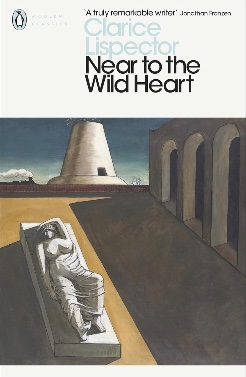HER FATHER'S TYPEWRITER WENT CLACK-CLACK .. clack-clack-clack ... The clock awoke in dustless tin-dlen. The silence dragged out zzzzzz. What did the wardrobe say? clothes-clothes-clothes. No, no. Amidst the clock, the typewriter and the silence there was an ear listening, large, pink and dead. The three sounds were connected by the daylight and the squeaking of the tree's little leaves rubbing against one another radiant. Leaning her forehead against the cold and shiny windowpane she gazed at the neighbor's yard, at the big world of the hens-that-didn't-know-they-were-going-to-die. And she could smell as if it were right beneath her nose the warm, hard-packed earth, so fragrant and dry, where she just knew, she just knew a worm or two was having a stretch before being eaten by the hen that the people were going to eat. There was a great, still moment, with nothing inside it. She dilated her eyes, waited. Nothing came. Blank. But suddenly the day was wound up and everything spluttered to life again, the typewriter trotting, her father's cigarette smoking, the silence, the little leaves, the naked chickens, the light, things coming to life again with the urgency of a kettle on the boil. The only thing missing was the tin-dlen of the clock that was ever so pretty. She closed her eyes, pretended to hear it and to the sound of the non-existent and rhythmic music rose up on tiptoes. She did three very light, winged dance steps. Then suddenly she looked at everything with distaste as if she had eaten too much of that mix-ture. "Oi, oi, oi.." she murmured wearily and then wondered: what's going to happen now now now? And always in the sliver of time that followed nothing happened if she kept waiting for what was going to happen, you see? She pushed away the difficult thought amusing herself with a movement of her bare foot on the dusty wooden floor. She rubbed her foot and watched her father out of the corner of her eye, waiting for his impatient and irritated glance. But nothing came. Nothing. It's hard to suck in people like the vacuum cleaner does. "Daddy, I've made up a poem."
"What's it called?"
"The Sun and I.'" With only a slight pause she recited: * The hens in the yard have eaten two worms but I didn't see them.'"
"Well? What do the sun and you have to do with the poem?"
She looked at him for a moment. He hadn't understood ..
"The sun is above the worms, Daddy, and I made up the poem and didn't see the worms ..."
Pause. "I can make up another one right now: "Hey sun, come play with me.' Or a longer one:
I saw a little cloud poor worm
I don't think she saw it.
